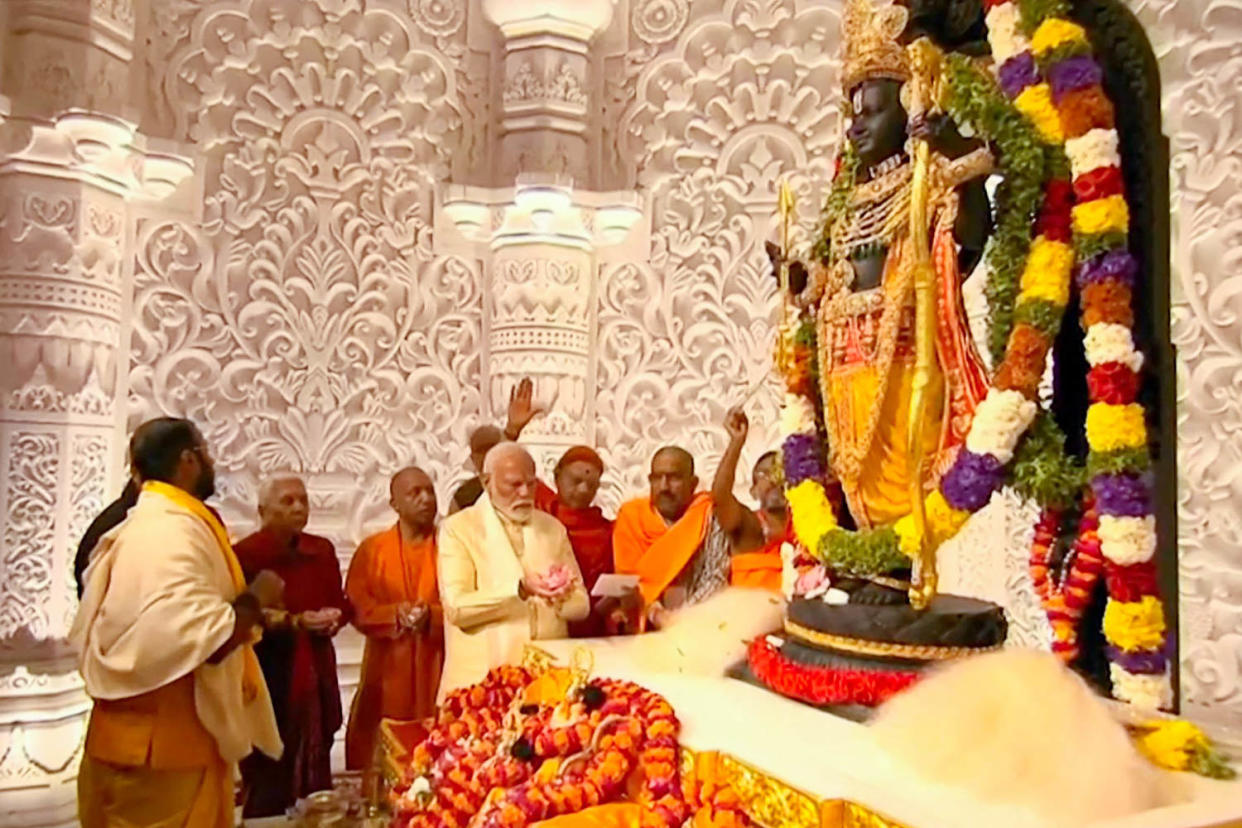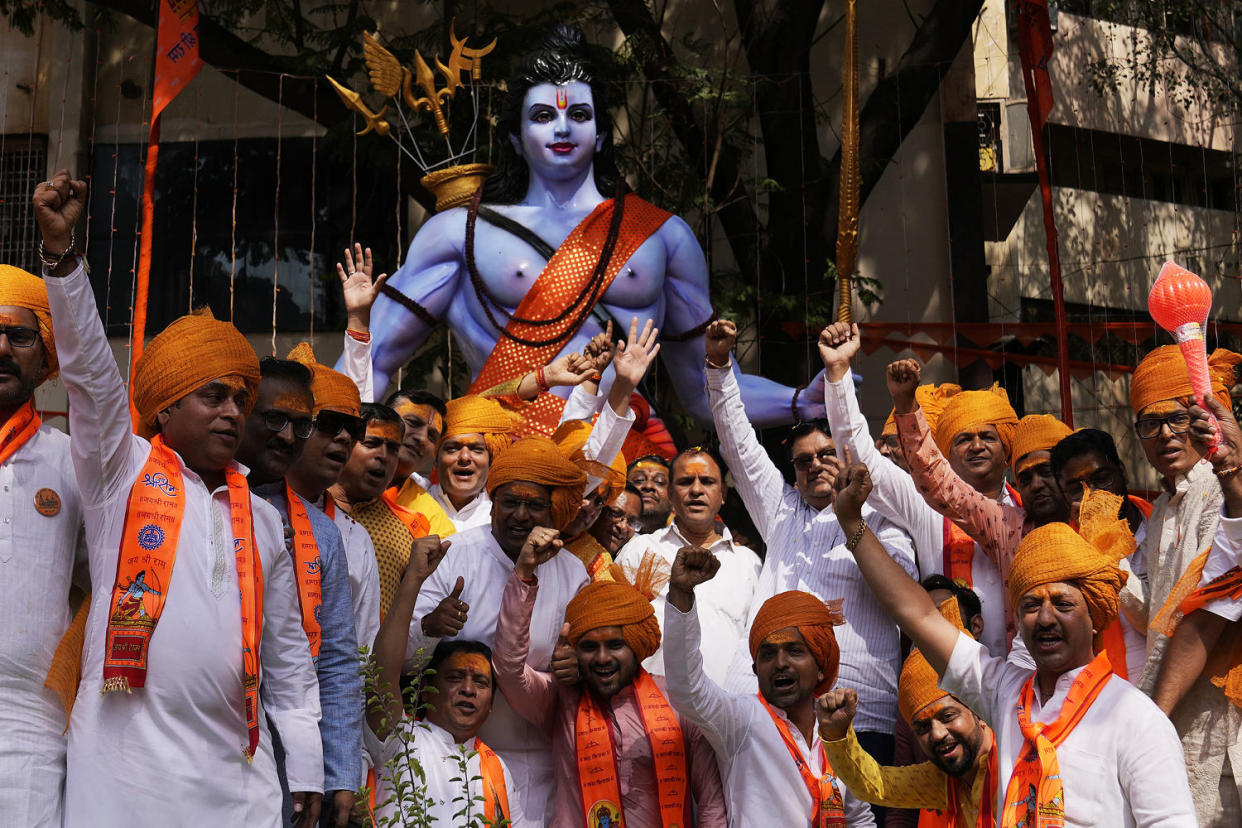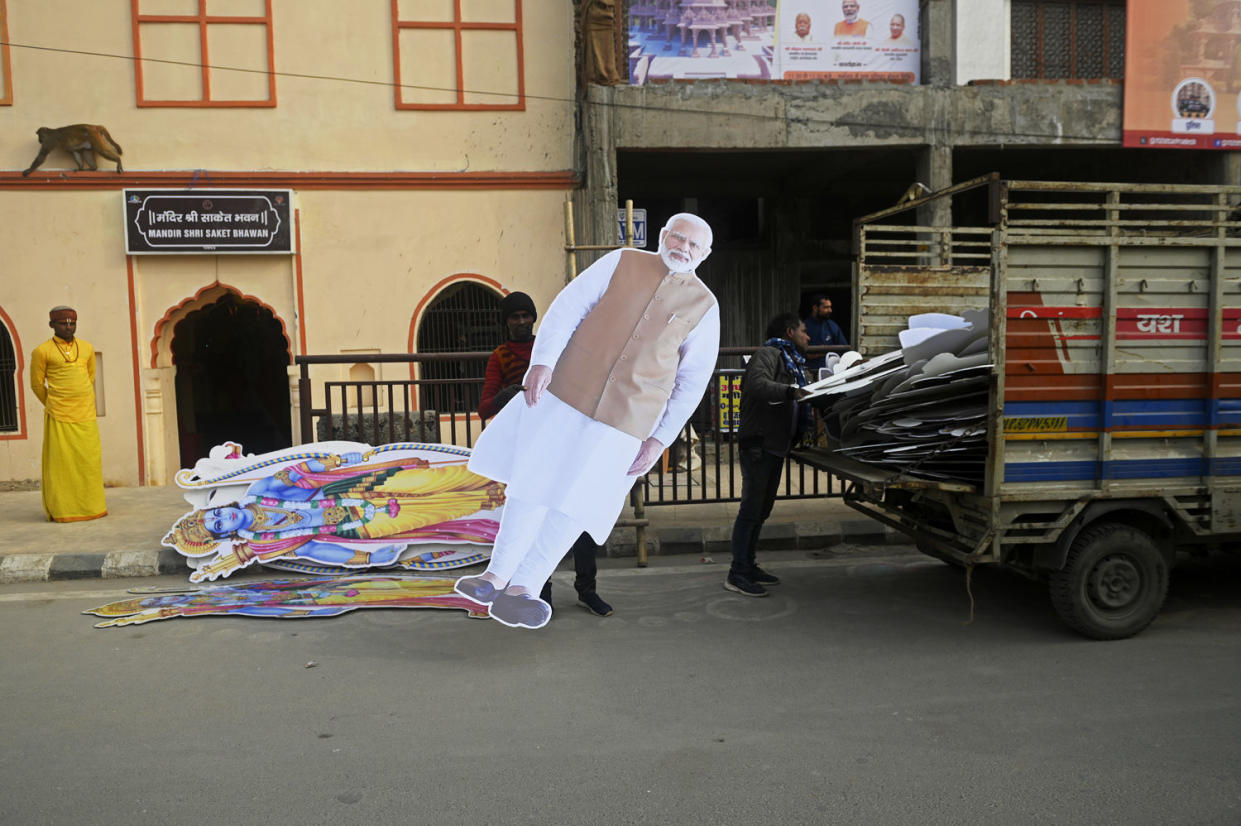India's Modi stokes tensions with opening of temple built on site of mosque destroyed by Hindu mob
India came to a halt Monday as Prime Minister Narendra Modi presided over the opening of a grand Hindu temple on a contested holy site that has become a symbol of religious tensions in the world’s largest democracy.
The $217 million Ram Mandir honors Lord Ram, the most revered deity in Hinduism, and is transforming Ayodhya, a city of about 3 million people in the northern Indian state of Uttar Pradesh, into a tourist hub that officials hope will be a Hindu version of the Vatican.
Dressed in a traditional kurta tunic, Modi led the consecration ceremony as Hindu priests chanted hymns and a 4.25-foot statue of Lord Ram was unveiled in the temple’s inner sanctum. Indian Air Force helicopters showered the temple with flower petals as Modi placed a lotus in front of the black stone idol, which was adorned with gold ornaments.
“After centuries of waiting, our Ram has arrived,” he said in a speech after the ceremony, addressing thousands of devotees, politicians, businesspeople and celebrities gathered for the event.
“We are laying the foundation of India for the next 1,000 years from this moment,” he said.

The temple was built on the site of Babri Masjid, a mosque dating to the 16th century that was destroyed by Hindu nationalist mobs in 1992, setting off riots across the country that killed about 2,000 people, mostly Muslims. In 2019, India’s Supreme Court ruled that the temple could be built on the disputed 7-acre site, in a controversial decision that was criticized by Muslim groups.
The inauguration of the temple, which is still far from complete, comes as Modi and his Hindu nationalist Bharatiya Janata Party prepare to run for a record third consecutive term in elections this spring. The BJP had been advocating for the temple for decades as a way to celebrate Hindu identity after centuries of Mughal and British rule. Its opening could help Modi win favor with voters in India, a country of 1.4 billion people that has been majority Hindu since it gained independence in 1947.
The consecration ceremony was celebrated as a national event, with many states declaring a public holiday, stock markets closing down and temples across the country holding their own ceremonies.
The Indian news media was dominated by coverage of the event, which was broadcast live across India and at Indian diplomatic missions and other sites around the world, including in Times Square in New York late Sunday.
In Mauritius, a small island nation in the Indian Ocean where almost half the population is Hindu, public officers of Hindu faith were given two hours off work to watch it.
Some Hindu religious leaders had refused to attend the ceremony, saying a Hindu temple cannot be consecrated until it is finished. Other critics, including India’s main opposition Congress party, accused Modi of stoking religious tensions.
Sunita Viswanath, executive director of the U.S.-based nonprofit group Hindus for Human Rights, said the ceremony was an “electoral stunt” that “should not be happening in the name of my faith.”
“Modi is not a priest, so leading this ceremony for political gain is both technically and morally wrong,” she said in a news release. “This weaponization of our religion tramples what’s left of India’s secular democratic values.”
The city of Ayodhya is remaking itself around the temple, which will be able to accommodate about 200,000 visitors a day. Roads have been widened, with the 8-mile, four-lane Ram Path guiding pilgrims to the pink sandstone, three-story structure.

A new airport, inaugurated by Modi last month, depicts the temple architecture on its facade and will eventually be able to handle 6 million passengers a year. Big new hotels are under construction, while local residents such as Amit Gupta are turning their homes into guesthouses.
Gupta, 35, who was born and raised in Ayodhya, said he was “very happy” about the temple.
“Now we are getting to see it completed in front of our eyes,” he said.
Gupta and his staff are pulling out all the stops to prepare for the anticipated influx of tourists in the coming weeks, with Gupta saying he is almost fully booked with visitors from around India.
“We are working very hard to ensure nobody arriving here has any trouble,” he said in a phone interview. “They should leave Ayodhya feeling that, ‘Not only Lord Ram but also the people there took care of us.’”
Some Hindus believe that Lord Ram was born on the exact site of Babri Masjid, and that the mosque had replaced a Hindu temple that was destroyed by Muslim invaders.
A spokesperson for Vishva Hindu Parishad, a Hindu nationalist group that has been criticized over its role in the destruction of the mosque in 1992, said this month that the effort to construct the temple was “bigger than the independence movement itself.”
In its 2019 ruling, the Supreme Court set aside a different area for the construction of a mosque, about 15 miles away. Though Haji Arfat Shaikh, head of the Indo-Islamic Cultural Foundation and a BJP politician, has said the new mosque will be “more beautiful than the Taj Mahal,” construction has yet to begin on the 5-acre site.
Modi has a high level of support in India, where his approval rating of 77% makes him the most popular leader in the world, according to the U.S.-based firm Morning Consult. His state visit to the White House last June drew crowds of supporters from the Indian diaspora but also protests over his human rights record.

Since Modi took office in 2014, press freedom in India has declined and communal violence against Muslims, Christians and other religious minorities has grown. He was also criticized in 2019 for revoking the limited autonomy of Kashmir, India’s only Muslim-majority region.
At the same time, India has risen in global stature, strengthening its ties with the United States and its allies as they seek to counterbalance China while also promoting its role as a leader of the Global South.
The U.S.-India relationship is not without its strains. In November, U.S. prosecutors charged an unnamed Indian government official they accused of plotting to assassinate a Sikh separatist leader living in New York. India has said such a crime would be “contrary to government policy.”
